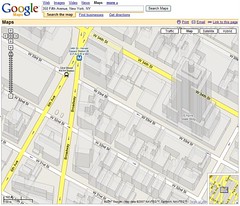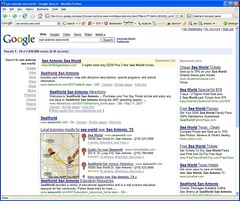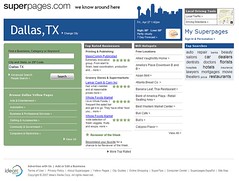Welcome to Natural Search Blog
Natural Search Blog provides articles on search engine optimization including keyword reasearch, on-page factors, link-building, social media optimization, local search optimization, image search optimization, and mobile SEO.
In addition to natural search optimization topics, we also cover internet marketing, ecommerce, web design, usability, and technology.
Recent Entries
Local Guides Beta Launch
Local Matters yesterday announced the launch of their new site, LocalGuides.com, which mashes up Local + Social + Vertical content and utilities. The site is really strong with some compelling features, so I’ve kicked the tires and have a few technical comments.
The press release they sent me contains the following quote from their CEO, Perry Evans:
“Consumers want more involvement with local information. While some progress has been made in a few entertainment categories, the search industry has failed to give consumers useful tools for personalized local information and opinions. LocalGuides.com fills this void by creating a relevant and engaging shared-consumer experience, while also helping local merchants find new ways to connect with their local audience. This is a big part of what has been missing in Local Search.�
The UI is beautifully clean and quite attractive. I can easily imagine that the simplicity and carefully local-oriented design would be readily adopted by users.
The conceptual format, which allows users to build out their personal local guides, is very, very strong. Just clicking into their “Explore Guides” link allows one to view custom local directories created by other users. One for Oxford, Mississippi immediately caught my eye, because it’s located very near where my grandmother used to live, and I’m quite familiar with the small town.
Possible Related Posts
Posted by Chris of Silvery on 05/17/2007
Permalink | |  Print
| Trackback | Comments Off on Local Guides Beta Launch | Comments RSS
Print
| Trackback | Comments Off on Local Guides Beta Launch | Comments RSS
Filed under: Local Search, Yellow Pages Local Search, Local-Guides, Local-Matters
Bill Gates Predicts Demise of Yellow Pages
Last week at the Microsoft Strategic Account Summit 2007, Bill Gates interacted with Microsoft’s Corporate VP and Chief Media Officer, Joanne Bradford in an interview/Q&A session, and he predicted that among those under 50, yellow pages usage would drop down to zero within five years!
Now, he was apparently speaking solely about the print yellow pages, but the statement still seemed a tad bit bearish, considering that Microsoft is partnered closely with my former company, Idearc Superpages.com, one of the largest yellow pages companies (print or otherwise) in the world, to license the yellow pages data and service for use in Microsoft’s Live Local Search, and for the MSN Yellow Pages.
Now, Gates isn’t alone in predicting the demise of printed directories, since many others have also foreseen their eventual extinction, including me. But I think that other analysts out there have stated terms more in the ten-year range. Even if the numbers of some directories are declining, I still note that usage and sales are still very strong, so I’d be inclined to expect that print YP will likely go on for longer than five years.
It could be even longer, if there’s some more revolutionary tech introduced, such as I earlier suggested in “Could Nanotechnology Save Print Yellow Pages?”
UPDATE: Don Dodge, Director of Business Development for Microsoft’s Emerging Business Team, also posted on his blog about the Summit, and he quoted a Seattle Times report which gave a further quote from Bill Gates about the yellow pages:
The traditional Yellow Pages are doomed as voice-activated Internet searches combined with on-screen interfaces on smart mobile devices get better and proliferate, Gates said. The company’s recent acquisition of voice-technology provider TellMe is accelerating the trend.
Dodge further states:
Microsoft’s recent acquisitions of MotionBridge and Screentonic, coupled with the acquisition of TellMe will support Gates vision of search and advertising on smart phones.
      Â
Possible Related Posts
Posted by Chris of Silvery on 05/16/2007
Permalink | |  Print
| Trackback | Comments Off on Bill Gates Predicts Demise of Yellow Pages | Comments RSS
Print
| Trackback | Comments Off on Bill Gates Predicts Demise of Yellow Pages | Comments RSS
Filed under: Local Search, MSN Search, Yellow Pages Bill-Gates, Live-Search, MicroSoft, msn, superpages, Yellow Pages
New Layout for Google Local Search Onebox Results
Chris Sherman earlier reported that Google was to begin displaying their OneBox content for news anywhere within the search results page, not just at the top of the organic results as they have been for some time. I’ve just in the last few days run across instances where the OneBox for local keyword searches has been appearing lower down in the page. Check it out:
This was a search for “San Antonio Sea World”. Read on for another example and comments.
Possible Related Posts
Posted by Chris of Silvery on 05/14/2007
Permalink | |  Print
| Trackback | Comments Off on New Layout for Google Local Search Onebox Results | Comments RSS
Print
| Trackback | Comments Off on New Layout for Google Local Search Onebox Results | Comments RSS
Filed under: Google, Local Search, Maps Google-Maps, Local Search, SERP-Layout, User-Interface
Google Maps Now Displaying Buildings in 3D
In some major metro areas, Google Maps has quietly begun displaying 3D building wireframes, visible when you’ve zoomed into the more close-up street level views. Here’s the Empire State Building:

[Google 3D Map of Empire State Building]
The 3D building shapes are apparently adopted from Google Earth, indicating further possible convergence may be on the horizon between the related Google projects.
Possible Related Posts
Posted by Chris of Silvery on 05/09/2007
Permalink | |  Print
| Trackback | Comments Off on Google Maps Now Displaying Buildings in 3D | Comments RSS
Print
| Trackback | Comments Off on Google Maps Now Displaying Buildings in 3D | Comments RSS
Filed under: Google, Local Search, Maps 3D, 3D-Maps, Google-Maps, Local Search
Flickr, why have you screwed up the ALT text?!?
Flickr,
you do a lot that I love – you’re easy to use, and you’ve built-in such elegantly simple and strong features. You’re engineered to function well for SEO, too – your pages are built with spider-friendly URLs, you have multiple link hierarchies, and you allow users to enter in lots of custom text which can allow for optimal TITLEs, H1 text, description captions, user-tagging, and cool geotagging. you even have a fairly cool blog to communicate with your community of users. But, you’ve messed something up this year that irritates the heck out of me:
Flickr’s ALT text is blank on the image pages!
Yes, it’s true – on each image’s main page, the image has nothing in the ALT portion of the image:
<img src=”http://farm1.static.flickr.com/36/112354736_1de2bc367c.jpg?v=0″ alt=”” width=”500″ height=”375″ onload=”show_notes_initially();” class=”reflect”>
I’m pretty sure that your ALT text was working in the past, but at some point, one of your developers made it so that the image’s custom title text no longer gets populated into the IMG ALT parameter, reducing one of the prime signals that inform search engines as to what keywords apply to an image.
Search engines aren’t the only ones that use that ALT text — it’s also important for the vision-impaired who surf the internet using “talking browsers”. Yeah, yeah — I know — why would the vision-impaired be surfing Flickr to begin with? Well, they can run across the pages when searching for various types of information, just like everyone else.
Please, please, Flickr: fix your ALT text!
Yours truly,
A Devoted Fan
Possible Related Posts
Posted by Chris of Silvery on 05/09/2007
Permalink | |  Print
| Trackback | Comments Off on Flickr, why have you screwed up the ALT text?!? | Comments RSS
Print
| Trackback | Comments Off on Flickr, why have you screwed up the ALT text?!? | Comments RSS
Filed under: Image Optimization, SEO flickr, image-alt, image-alt-text, img-alt, SEO
Technorati Authority Number Now Decides Blog Rankings
On Friday, I noticed that Technorati instituted a new change in how they report info about blogs they track. Previously, they displayed the total number of inlinks from the total number of blogs linking to a blog. For example, they’d state “__ blogs link here” and “X links from Y blogs”. They now only state the total number of blogs that link to a blog, and they’re calling that measure the “Technorati Authority” number.
Technorati only counts the total number of blogs which link to another blog for the Authority number, not the total number of links – which is good, since various blog features like categorization pages, preview snippets, and other pagination and navigation schemes common to blogs can cause a link from a single posting to reappear multiple times from a blog’s site.
Possible Related Posts
Posted by Chris of Silvery on 05/08/2007
Permalink | |  Print
| Trackback | Comments Off on Technorati Authority Number Now Decides Blog Rankings | Comments RSS
Print
| Trackback | Comments Off on Technorati Authority Number Now Decides Blog Rankings | Comments RSS
Filed under: Blog Optimization, Link Building Blog Optimization, Blog-Rank, BlogRank, nofollow, Technorati, trackback-submitter
Tips for University & College Website Search Engine Optimization – SEO
A couple of weeks ago when I spoke at the American Marketing Association’s Hot Topic day on Search Marketing in San Francisco, I got a lot of SEO questions from attendees who were from the educational community. I realized that college and university websites have a lot of unique aspects to consider in natural search optimization, and that there’s not a lot of specific advice out there specifically for them, so I thought I’d put together a brief list of tips which could be beneficial to any .EDU webmasters who are looking to improve their natural search marketing. Read on for more info.
Possible Related Posts
Posted by Chris of Silvery on 05/03/2007
Permalink | |  Print
| Trackback | Comments Off on Tips for University & College Website Search Engine Optimization – SEO | Comments RSS
Print
| Trackback | Comments Off on Tips for University & College Website Search Engine Optimization – SEO | Comments RSS
Filed under: HTML Optimization, Search Engine Optimization, SEO College-Search-Engine-Optimization, College-SEO, EDU-SEO, Educational-IT, Optimization-for-.EDU-Sites, Schools-SEO, University-Search-Engine-Optimization, University-SEO
Superpages Launches New Redesign
I noticed that my old company, Idearc Media, just launched a major new redesign today for their primary web property, Superpages.com:
Read on for a few of my comments about it.
Possible Related Posts
Posted by Chris of Silvery on 04/27/2007
Permalink | |  Print
| Trackback | Comments Off on Superpages Launches New Redesign | Comments RSS
Print
| Trackback | Comments Off on Superpages Launches New Redesign | Comments RSS
Filed under: Design, Local Search, Yellow Pages idearc, Local Search, superpages, Superpages.com, Yellow Pages
Superpages to Factor CTR into Ad Rankings
I noticed that Greg Sterling just reported over at Search Engine Land that Idearc Media’s Superpages is going to begin factoring in ad click-through-rates into the measures used for ranking ads on the vast networks of sites where Superpages content appears. I was aware of this plan prior to my departure from Superpages, and I think it’s one of the cooler things my old teammates are developing.
Naturally, this follows other major ad networks who do similar things. Google, for instance, has begun using quality scores to decide ad rankings and the pricing of the ads.
Possible Related Posts
Posted by Chris of Silvery on 04/26/2007
Permalink | |  Print
| Trackback | Comments Off on Superpages to Factor CTR into Ad Rankings | Comments RSS
Print
| Trackback | Comments Off on Superpages to Factor CTR into Ad Rankings | Comments RSS
Filed under: Advertising, Paid Search, Yellow Pages Ad-Rankings, Advertising, CTR, idearc, Idearc-Media, Pay-Per-Click, ppc, superpages, Superpages.com
Subdomains for Local Directory Sites?
Earlier this week, my column on “Domaining & Subdomaining in the Local Space – Part 1” went live at Search Engine Land. In it, I examine how a number of local business directory sites are using subdomains with the apparent desire to get extra keyword ranking value from them. Typically, they will pass the names of cities in the third-level-domain names (aka “subdomains”). Some sites doing that include:
- CitySearch
- Craigslist
- Local.com
In that installment, I conclude that the subdomaining for the sake of keyword ranking has no real benefit.
This assertion really can be extended out to all other types of sites as well, since the ranking criteria that the search engines use is not limited to only local info sites. Keywords in subdomains really have no major benefit.
SEO firms used to suggest that people deploy their content out onto “microsites” for all their keywords – a different domain name to target each one. This just isn’t a good strategy, really. Focus on improving the quality of content for each keyword, founded on its own page, and work on your link-building efforts (quality link-building, not unqualified bad-quality links). Tons of keyword domains or subdomains is no quick solution for ranking well.
Possible Related Posts
Posted by Chris of Silvery on 04/26/2007
Permalink | |  Print
| Trackback | Comments Off on Subdomains for Local Directory Sites? | Comments RSS
Print
| Trackback | Comments Off on Subdomains for Local Directory Sites? | Comments RSS
Filed under: Local Search Optimization, Search Engine Optimization, SEO, Site Structure, URLs Domain Names, Local Search Optimization, local-search-engine-optimization, local-SEO, SEO, subdomaining, subdomains






